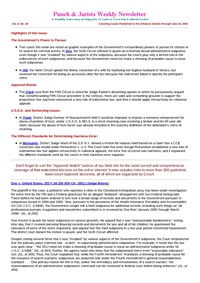Loaded on
July 1, 2001
published in Punch and Jurists
July 23, 2001
In 1998, the plaintiff in this case was a duly licensed fireams dealer with the Bureau of Alcohol, Tobacco and Firearms (ATF). In March of trhat year, he was in Laredo, Texas, participating in a gun show. One evening he and three assistants decided to cross the border into …
Loaded on
July 1, 2001
published in Punch and Jurists
July 23, 2001
Here the court held it would be improper to impose a sentence enhancement for abuse of position of trust under U.S.S.G. § 3B1.3 in a stock churning case involving a 90-year old client because that factor was already included in the definition of the crime.
One of the …
Loaded on
July 1, 2001
published in Punch and Jurists
July 23, 2001
Here, reversing a 1982 decision of the Seventh Circuit and joining with all the other Circuits to have ruled on the issue, the Court held that intent to reenter the country without the express consent of the Attorney General is not an element of the crime.
Loaded on
July 1, 2001
published in Punch and Jurists
July 23, 2001
Here the Court affirmed a district court's order denying a motion to quash an administrative subpoena in a health care fraud investigation - a decision that reviewed the current law on the broad scope of permissible administrative searches.
The plaintiff in this case, a podiatrist who operates a …
Loaded on
July 1, 2001
published in Punch and Jurists
July 23, 2001
Here the Court held that where a district court could have imposed consecutive prison terms for each count of the indictment, its finding that concurrent terms for both counts was appropriate punishment for the defendant rendered its violation of the Apprendi-rule prejudicial.
Loaded on
July 1, 2001
published in Punch and Jurists
July 23, 2001
Here the Court rejected a series of defense motions, holding, inter alia, that the Government's alleged suppression of Brady evidence was not material to the defendant's prosecution.
Loaded on
July 1, 2001
published in Punch and Jurists
July 23, 2001
This case offers a disturbing look at the virtually unlimited power of the Government to pursue a target - relentlessly - even if the purpose of that pursuit is to gain leverage so it can get at someone else. The defendant in this case, Patricia King Hill (Patricia), an …
Loaded on
July 1, 2001
published in Punch and Jurists
July 23, 2001
[Editor's Note: For a contrary decision, see Brackett v. U.S., No. 01-1466 (1st Cir. 10/31/2001)].
Here the Court concluded that the one-year statute of limitations contained in 28 USC § 2255 for motions to vacate challenging an enhanced Federal sentence based on newly-vacated state court conviction begins to …
Loaded on
July 1, 2001
published in Punch and Jurists
July 23, 2001
Here, the Court concluded: "Under the Sentencing Commission Guidelines the power to impose a sentence has been virtually transferred from the court to the government, which, as the prosecuting authority, is an interested party to the case. This transfer constitutes an erosion of judicial power and a breach in …
Loaded on
July 1, 2001
published in Punch and Jurists
July 23, 2001
This case is a good example of the hoops through which a defendant must sometimes jump in his pursuit of appellate relief based on the Supreme Court’s decision in Apprendi v. New Jersey, 530 U.S. 466 (2000). The defendant in this case appealed from a district court’s ruling that …
